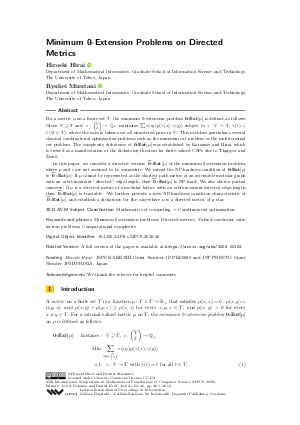Minimum 0-Extension Problems on Directed Metrics
Authors
Hiroshi Hirai  ,
Ryuhei Mizutani
,
Ryuhei Mizutani 
-
Part of:
Volume:
45th International Symposium on Mathematical Foundations of Computer Science (MFCS 2020)
Part of: Series: Leibniz International Proceedings in Informatics (LIPIcs)
Part of: Conference: Mathematical Foundations of Computer Science (MFCS) - License:
 Creative Commons Attribution 3.0 Unported license
Creative Commons Attribution 3.0 Unported license
- Publication Date: 2020-08-18
File

PDF
LIPIcs.MFCS.2020.46.pdf
- Filesize: 0.63 MB
- 13 pages
Document Identifiers
Related Versions
-
A full version of the paper is available at https://arxiv.org/abs/2006.00153.
Subject Classification
ACM Subject Classification
- Mathematics of computing → Combinatorial optimization
Keywords
- Minimum 0-extension problems
- Directed metrics
- Valued constraint satisfaction problems
- Computational complexity
Metrics
- Access Statistics
-
Total Accesses (updated on a weekly basis)
0PDF Downloads0Metadata Views
Abstract
For a metric μ on a finite set T, the minimum 0-extension problem 0-Ext[μ] is defined as follows: Given V ⊇ T and c:(V 2) → ℚ+, minimize ∑ c(xy)μ(γ(x),γ(y)) subject to γ:V → T, γ(t) = t (∀ t ∈ T), where the sum is taken over all unordered pairs in V. This problem generalizes several classical combinatorial optimization problems such as the minimum cut problem or the multiterminal cut problem. The complexity dichotomy of 0-Ext[μ] was established by Karzanov and Hirai, which is viewed as a manifestation of the dichotomy theorem for finite-valued CSPs due to Thapper and Živný. In this paper, we consider a directed version 0→-Ext[μ] of the minimum 0-extension problem, where μ and c are not assumed to be symmetric. We extend the NP-hardness condition of 0-Ext[μ] to 0→-Ext[μ]: If μ cannot be represented as the shortest path metric of an orientable modular graph with an orbit-invariant "directed" edge-length, then 0→-Ext[μ] is NP-hard. We also show a partial converse: If μ is a directed metric of a modular lattice with an orbit-invariant directed edge-length, then 0→-Ext[μ] is tractable. We further provide a new NP-hardness condition characteristic of 0→-Ext[μ], and establish a dichotomy for the case where μ is a directed metric of a star.
Cite As Get BibTex
Hiroshi Hirai and Ryuhei Mizutani. Minimum 0-Extension Problems on Directed Metrics. In 45th International Symposium on Mathematical Foundations of Computer Science (MFCS 2020). Leibniz International Proceedings in Informatics (LIPIcs), Volume 170, pp. 46:1-46:13, Schloss Dagstuhl – Leibniz-Zentrum für Informatik (2020)
https://doi.org/10.4230/LIPIcs.MFCS.2020.46
BibTex
@InProceedings{hirai_et_al:LIPIcs.MFCS.2020.46,
author = {Hirai, Hiroshi and Mizutani, Ryuhei},
title = {{Minimum 0-Extension Problems on Directed Metrics}},
booktitle = {45th International Symposium on Mathematical Foundations of Computer Science (MFCS 2020)},
pages = {46:1--46:13},
series = {Leibniz International Proceedings in Informatics (LIPIcs)},
ISBN = {978-3-95977-159-7},
ISSN = {1868-8969},
year = {2020},
volume = {170},
editor = {Esparza, Javier and Kr\'{a}l', Daniel},
publisher = {Schloss Dagstuhl -- Leibniz-Zentrum f{\"u}r Informatik},
address = {Dagstuhl, Germany},
URL = {https://drops.dagstuhl.de/entities/document/10.4230/LIPIcs.MFCS.2020.46},
URN = {urn:nbn:de:0030-drops-127120},
doi = {10.4230/LIPIcs.MFCS.2020.46},
annote = {Keywords: Minimum 0-extension problems, Directed metrics, Valued constraint satisfaction problems, Computational complexity}
}
Author Details
- Department of Mathematical Informatics, Graduate School of Information Science and Technology, The University of Tokyo, Japan
Funding
- Hirai, Hiroshi: JSPS KAKENHI Grant Number JP17K00029 and JST PRESTO Grant Number JPMJPR192A, Japan.
Acknowledgements
We thank the referees for helpful comments.
References
-
Hans-Jürgen Bandelt. Networks with condorcet solutions. European Journal of Operational Research, 20(3):314-326, 1985.

-
Hans-Jürgen Bandelt, Marcel van de Vel, and Eric R. Verheul. Modular interval spaces. Mathematische Nachrichten, 163:177-201, 1993.

-
Garrett Birkhoff. Lattice Theory. American Mathematical Society, third edition, 1967.

-
Victor Chepoi. Classification of graphs by metric triangles. Metody Diskretnogo Analyza, 49:75-93, January 1989.

- Victor Chepoi. A multifacility location problem on median spaces. Discrete Applied Mathematics, 64(1):1-29, 1996. URL: https://doi.org/10.1016/0166-218X(95)00115-8.
- Elias Dahlhaus, David S. Johnson, Christos H. Papadimitriou, Paul D. Seymour, and Mihalis Yannakakis. The complexity of multiterminal cuts. SIAM Journal on Computing, 23(4):864-894, 1994. URL: https://doi.org/10.1137/S0097539792225297.
- Hiroshi Hirai. Tight spans of distances and the dual fractionality of undirected multiflow problems. Journal of Combinatorial Theory, Series B, 99(6):843-868, 2009. URL: https://doi.org/10.1016/j.jctb.2009.03.001.
- Hiroshi Hirai. Folder complexes and multiflow combinatorial dualities. SIAM Journal on Discrete Mathematics, 25(3):1119-1143, 2011. URL: https://doi.org/10.1137/090767054.
- Hiroshi Hirai. Discrete convexity and polynomial solvability in minimum 0-extension problems. Mathematical Programming, 155(1-2):1-55, 2016. URL: https://doi.org/10.1007/s10107-014-0824-7.
- Alexander V. Karzanov. Metrics with finite sets of primitive extensions. Annals of Combinatorics, 2:213-243, 1998. URL: https://doi.org/10.1007/BF01608533.
- Alexander V. Karzanov. Minimum 0-extensions of graph metrics. European Journal of Combinatrics, 19(1):71-101, 1998. URL: https://doi.org/10.1006/eujc.1997.0154.
- Alexander V. Karzanov. Hard cases of the multifacility location problem. Discrete Applied Mathematics, 143(1-3):368-373, 2004. URL: https://doi.org/10.1016/j.dam.2003.05.005.
- Alexander V. Karzanov. One more well-solved case of the multifacility location problem. Discrete Optimization, 1:51-66, 2004. URL: https://doi.org/10.1016/S0166-218X(03)00342-1.
- Vladimir Kolmogorov, Johan Thapper, and Stanislav Živný. The power of linear programming for general-valued csps. SIAM Journal on Computing, 44(1):1-36, 2015. URL: https://doi.org/10.1137/130945648.
-
Barbaros C. Tansel, Richard L. Francis, and Timothy J. Lowe. Location on networks: A survey. part i, ii. Management Science, 29(4):482-511, 1983.

- Johan Thapper and Stanislav Živný. The power of linear programming for valued csps. In 53rd Annual IEEE Symposium on Foundations of Computer Science, FOCS 2012, pages 669-678. IEEE Computer Society, 2012. URL: https://doi.org/10.1109/FOCS.2012.25.
- Johan Thapper and Stanislav Živný. The complexity of finite-valued csps. Journal of the ACM, 63(4):37:1-37:33, 2016. URL: https://doi.org/10.1145/2974019.
-
M.L.J. van de Vel. Theory of Convex Structures. North Holland, 1993.

- Stanislav Živný. The Complexity of Valued Constraint Satisfaction Problems. Springer, 2012. URL: https://doi.org/10.1007/978-3-642-33974-5.
